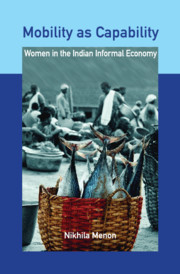Book contents
- Frontmatter
- Dedication
- Contents
- List of Tables
- List of Figures
- Preface
- 1 Transformational Mobility as Capability
- 2 Reflections on Transformational Mobility, Autonomy, and Women's Work
- 3 Women in ‘Kerala Model’: Myths and Realities
- 4 Situating Informal Work by Women in Fisheries in Kerala
- 5 ‘Measuring Mobility’ of Women: Unravelling the ‘Explicit’ and the ‘Implicit’
- 6 Pathways to Transformational Mobility of Women Workers: A Qualitative Comparative Analysis
- 7 ‘Subordinating Self’: ‘Manoeuvring Patriarchy’ among Women Workers
- 8 Self-Categorization, Group Identity, and Agency among Women Fish Vendors
- 9 Transformational Mobility: From Individual to Collective Agency of Informal Women Workers
- Bibliography
- Index
6 - Pathways to Transformational Mobility of Women Workers: A Qualitative Comparative Analysis
Published online by Cambridge University Press: 24 May 2020
- Frontmatter
- Dedication
- Contents
- List of Tables
- List of Figures
- Preface
- 1 Transformational Mobility as Capability
- 2 Reflections on Transformational Mobility, Autonomy, and Women's Work
- 3 Women in ‘Kerala Model’: Myths and Realities
- 4 Situating Informal Work by Women in Fisheries in Kerala
- 5 ‘Measuring Mobility’ of Women: Unravelling the ‘Explicit’ and the ‘Implicit’
- 6 Pathways to Transformational Mobility of Women Workers: A Qualitative Comparative Analysis
- 7 ‘Subordinating Self’: ‘Manoeuvring Patriarchy’ among Women Workers
- 8 Self-Categorization, Group Identity, and Agency among Women Fish Vendors
- 9 Transformational Mobility: From Individual to Collective Agency of Informal Women Workers
- Bibliography
- Index
Summary
It is seldom, if ever, between a consequent and a single antecedent, that this invariable sequence subsists. It is usually between a consequent and the sum of several antecedents; the concurrence of all of them being requisite to produce, that is, to be certain of being followed by, the consequent. In such cases it is very common to single out one only of the antecedents under the denomination of Cause, calling the others merely Conditions.
—J. S. Mill (System of Logic, 1843)Social phenomena are the result of multiple causes and conditions. In cultures where mobility is gendered, there are multiple conditions that can influence the mobility of women in social, community, and work spaces. Transformational mobility (TM) is the freedom and ability to move outside the household without constraints from others. It is autonomy in mobility which implies freedom of movement in the real sense, and it is a capability which enhances the potential for flourishing of women workers. The mobility is constrained in many ways among fish vendors and peeling workers, though they move outside the household for work. However, for those women workers who experience TM or have reached a higher level of mobility, the casual pathways may vary. The question is, what are the causal mechanisms or configurational pathways to ‘high and transformational mobility’ in the context of peeling workers and fish vendors in fisheries?
Qualitative comparative analysis (QCA) is a comparative case study method that aims to understand particular social phenomena on a contextual and case-oriented manner. To explore the causal conditions that can result in high mobility and TM (autonomy in mobility) among peeling workers and fish vendors, I have used crisp set qualitative comparative analysis (csQCA) models to analyse the causal conditions or causal pathways to high mobility and TM of informal women workers in fisheries. As the peeling workers and self-employed fish vendors have different types/nature of work and have certain differences in the social background, I have adopted two csQCA models separately for each group of workers to analyse their pathways to high mobility and TM.
Transformational mobility among peeling workers
There are multiple pathways with different combinations of conditions which result in TM. By understanding the cases of informal workers, peeling workers, and fish vendors, the method of QCA has yielded pathways to TM which differ between peeling workers and fish vendors.
- Type
- Chapter
- Information
- Mobility as CapabilityWomen in the Indian Informal Economy, pp. 93 - 117Publisher: Cambridge University PressPrint publication year: 2021

